#President Luiz Inacio Lula da Silva
Explore tagged Tumblr posts
Text
Chinese Senior Diplomat Calls To Resist Cold War Mentality At BRICS Security Meetings
— Global Times Staff Reporters | July 25, 2023
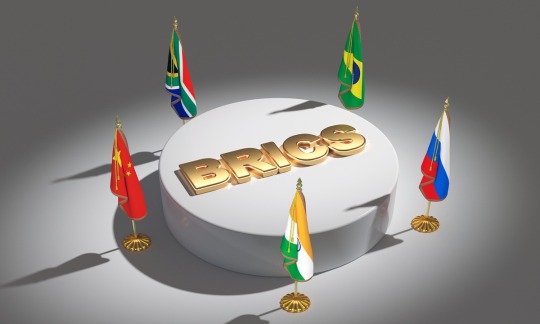
Photo: BRICS. VCG
Cyber security as well as other threats in traditional and non-traditional security fields have taken the spotlight at the ongoing meetings of BRICS countries in Johannesburg, South Africa, as analysts said that amid growing global uncertainties, more developing countries are seeking to improve solidarity to jointly tackle challenges to their development under the auspices of the BRICS mechanism.
While attending the 13th Meeting of BRICS National Security Advisers and High Representatives on National Security in Johannesburg, South Africa on Tuesday, senior Chinese diplomat Wang Yi said that after more than 10 years of development, the BRICS has become an important platform for emerging market countries and developing countries to unite and self-development.
Under the new situation, we must grasp the future development direction of the BRICS countries, further strengthen political mutual trust and strategic coordination, continue to provide international public goods that meet the requirements of the times, and strive to translate the BRICS spirit of openness, inclusiveness, and win-win cooperation into practical actions, and polish the "golden brand" of BRICS cooperation, Wang said.
To deal with the current global security challenges and solve the security dilemma, Wang also called for countries to resist unilateralism, hegemony and oppose "decoupling" and "double standards" and oppose Cold War mentality and zero-sum game.
Analysts said that the ongoing meetings for security advisors and senior diplomats from BRICS countries and "Friends of BRICS" underscored the security concerns of developing countries and new emerging economies over the destructive activities, "color revolutions" and cyber attacks plotted by some countries who have posed great threats to the stable development of developing countries and global peace.
Aside from expressing their concerns over traditional and non-traditional security fields, BRICS countries and developing countries are seeking to improve solidarity to jointly tackle development challenges under the BRICS mechanism, which will also be part of the build-up to the 15th BRICS Summit in South Africa to be held from August 22 to 24, they noted.
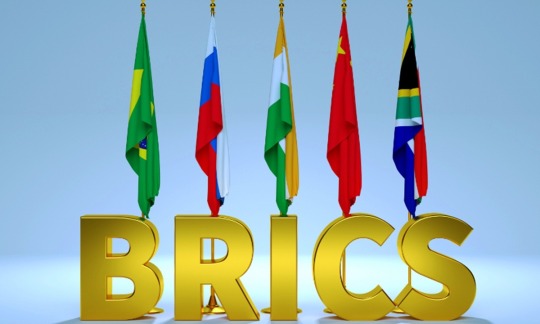
On Monday, a meeting, which was held under the theme of "Cyber security is increasingly becoming a challenge for developing countries," is also being attended by Minister in the Presidency of South Africa Khumbudzo Ntshavheni, Chief Adviser of the Presidency of Brazil Celso Luiz Nunes Amorim, Secretary of the Security Council of the Russian Federation Nikolai Patrushev, National Security Adviser Ajit Doval of India and representatives of Belarus, Iran, Saudi Arabia, Egypt, Burundi, the United Arab Emirates, Kazakhstan, Cuba and other countries.
Security Concerns Under Spotlight
During the Tuesday meeting, Wang, member of the Political Bureau of the Communist Party of China (CPC) Central Committee and also director of the Office of the CPC Central Commission for Foreign Affairs, said that the "Global South" is a collection of emerging market countries and developing countries, reflecting our collective rise on the international stage. Countries in the "Global South" face the important mission of resisting the external intervention and maintaining political security and regime security.
Wang Yi said that unity is strength, action is direction, and openness is motivation. China is willing to work with BRICS partners to support each other's efforts to maintain national security and stability, and to carry out more practical cooperation in dealing with international security challenges, so that the world can hear more BRICS voices and witness a greater role of the BRICS.
Senior officials on security from BRICS countries also exchanged in-depth views on issues such as current security challenges, anti-terrorism and cyber security, food and water security, and energy security, and reached broad consensus, according to a release from Chinese Foreign Ministry.
The issue of cyber security has been discussed at length at the ongoing BRICS meeting as some Western countries have intensified using the internet to conduct destructive activities in other countries, including inciting domestic riots, fooling the public or organizing cyber attacks on governmental departments, which have posed threats to developing countries' stability and development, Song Zhongping, a Chinese military expert and TV commentator, told the Global Times on Tuesday.
The meeting on security, together with other meetings in various fields, will lay the groundwork for the leaders' summit in August, as the BRICS mechanism is a cooperative mechanism beyond economic and security fields, and whether it is regarding traditional or non-traditional fields, it would safeguard development and cooperation in other areas, Song said.
This year's BRICS summit will focus on improving cooperation between BRICS members and African countries in technology, economy and other fields, and security would also be the basis for cooperation, said Song.
South Africa has invited the heads of state of all African countries to the summit, which is themed as "BRICS and Africa: Partnership for Mutually Accelerated Growth, Sustainable Development, and Inclusive Multilateralism." The summit is anticipated to discuss how BRICS countries can better work with African countries, media reported.
Security is the core concern for the financial cooperation of BRICS countries and other developing countries. This is also why BRICS countries are studying the potential use of alternative currencies to the US dollar, analysts said.

For the past months, many media, especially those from the West and the US, have reported that BRICS countries are seeking to shift from the dollar in mutual trade to avoid becoming "victim" to sanctions. For example, in April, Bloomberg reported that Brazilian President Luiz Inacio Lula da Silva called on BRICS countries to come up with an alternative to the dollar in foreign trade.
South Africa, the BRICS chair, has put the stability of the global financial system as a priority for the BRICS meetings, as BRICS countries and developing countries have been put in an unfavorable position that would be affected by global financial hegemony, Wang Lei, director of the Center for BRICS Cooperation Studies at Beijing Normal University, told the Global Times.
However, de-dollarization is not the core mission of BRICS countries and what they want is to make the global financial system fairer and more inclusive, and to better reflect the major changes that have happened in the global governing system, Wang Lei said.
Against the backdrop of the continuous Russia-Ukraine conflict and drastic global changes unseen in a century, developing countries are seeking to inject more stable and secure impetus to the world and to promote the international governing system to be more inclusive and better reflect their interests. However, the US and some Western media have smeared their efforts, analysts said.
What BRICS countries are working toward is not to compete with the US for its hegemony, but to build a multipolar world in which each country's concerns on security, economy and developments can be respected by others - this may also be the reason for the US and West's increasing worries of the growing influence and attractiveness of BRICS, Song said.
#BRICS#South Africa 🇿🇦#Cold War Mentality#Decoupling#Double Standards#Cyber Security#Global South#China 🇨🇳#Mutually Accelerated Growth#Sustainable Development#Multilateralism#Bloomberg#Brazil 🇧🇷#President Luiz Inacio Lula da Silva#Global Times#Alternative Currencies#US Dollar 🇺🇸
6 notes
·
View notes
Text
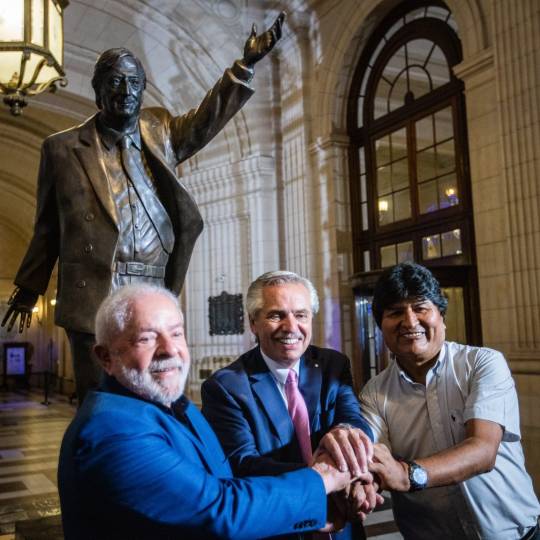
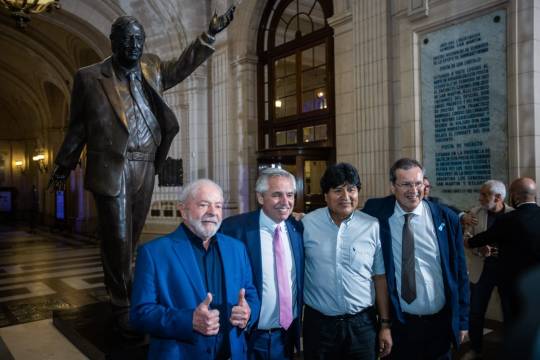
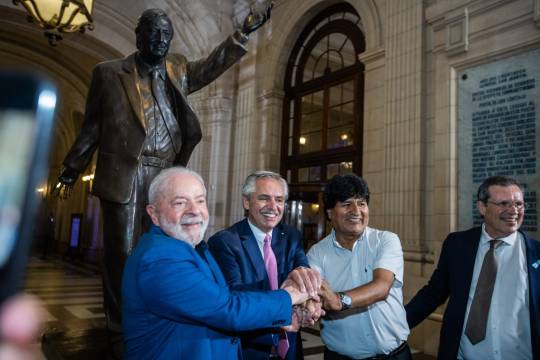
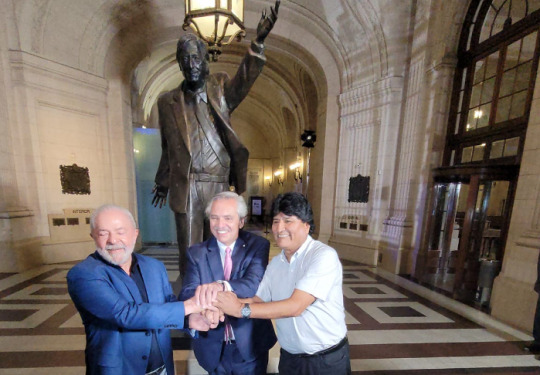
Luiz Inacio Lula da Silva, Alberto Fernandez and Evo Morales standing in front of a statue of former Argentinian President Nestor Kirchner, at the Nestor Kirchner Centro Cultural Kirchner in Buenos Aires, Argentina, 23 January 2023
#Luiz Inacio Lula da Silva#Lula da Silva#Lula#Brazil#Brasil#Evo Morales#Bolivia#Alberto Fernandez#Nestor Kirchner statue#Argentina#also Cristina Fernandez de Kirchner met Honduran President Xiomara Castro
2 notes
·
View notes
Text
Thousands of people rallied this week in Brasília for the 20th annual Free Land Camp—the largest gathering of Indigenous people in Brazil—where participants demanded that President Luiz Inácio Lula da Silva's administration safeguard their lands and cultural rights
Organized by the Association of Brazil's Indigenous Peoples (APIB), the five-day Free Land Camp—in Portuguese, Acampamento Terra Livre (ATL)—wrapped up Friday after a week of solidarity and action. Activities included rallies and marches; events commemorating slain Indigenous activists; and plenary sessions on the climate emergency, education, mental health, and more
Some participants criticized Lula—who was notably absent from this year's ATL after attending the previous two camps—for what they said was his failure to fulfill campaign promises to Indigenous Brazilians—although attendees also acknowledged that his administration has taken major steps toward tackling illegal resource extraction and demarcating tribal lands.
Two big issues at this year's ATL—whose theme was "Our Existence is Ancestral: We Have Always Been Here!"—were the demarcation of Indigenous lands and opposition to proposed Amazon megaprojects, especially the plan to build the EF-170 railway through the heart of the imperiled rainforest in order to boost mining, logging, agribusiness, and other resource extraction and exploitation.
Last year, Brazilian lawmakers overruled Lula's partial veto of the highly contentious "Marco Temporal" law, which effectively paused demarcations and potentially opened more Indigenous lands to exploitation.
#enviromentalism#ecology#brazil#president lula#luiz inacio lula da silva#indigenous activism#indigenous rights#Free Land Camp#Association of Brazils indigenous peoples#demarcation
0 notes
Text
The Best News of Last Week
1. Arizona governor Ok's over the counter birth control
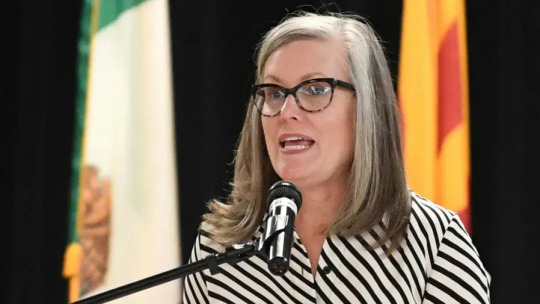
Arizona Gov. Katie Hobbs (D) has expanded access to over-the-counter birth control that will “soon be available to Arizonans,” according to a press release.
Arizonans 18 and older will soon be able to go to their local pharmacy and purchase oral contraceptives without a doctor’s prescription.
2. ‘Great news’: EU hails discovery of massive phosphate rock deposit in Norway

A massive underground deposit of high-grade phosphate rock in Norway, pitched as the world’s largest, is big enough to satisfy world demand for fertilisers, solar panels and electric car batteries over the next 50 years, according to the company exploiting the resource. About 90% of the world’s mined phosphate rock is used in agriculture for the production of phosphorous for the fertiliser industry, for which there is currently no substitute.
3. U.S. Is Destroying the Last of Its Once-Vast Chemical Weapons Arsenal
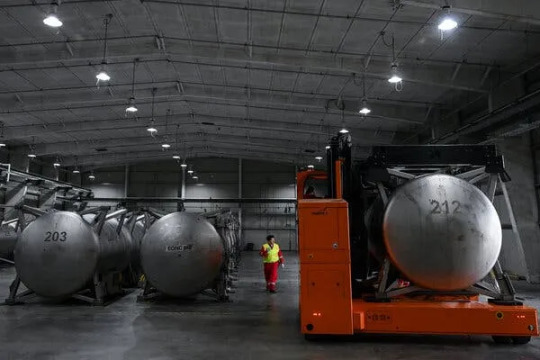
Decades behind its initial schedule, the dangerous job of eliminating the world’s only remaining declared stockpile of lethal chemical munitions will be completed as soon as Friday.
4. Chinese scientists create edible food packaging to replace plastic

By incorporating certain soy proteins into the structure, Chinese University of Hong Kong scientists successfully created edible food packaging.
5. World's 1st 'tooth regrowth' medicine moves toward clinical trials in Japan

A Japanese research team is making progress on the development of a groundbreaking medication that may allow people to grow new teeth, with clinical trials set to begin in July 2024. The tooth regrowth medicine is intended for people who lack a full set of adult teeth due to congenital factors.
6. No Longer Endangered: The Bald Eagle is an Icon of the ESA

When the Endangered Species Act (ESA) was enacted in 1973, bald eagle population numbers across the country showed that the species was close to disappearing. Before the ESA, in the 1950s and ‘60s, eagles were shot routinely despite the protection. The ESA listing helped bring public attention to the issue.
Through the early 1970s and into the early ‘80s, numbers increased gradually. Then, as you got into the ‘90s, there was still gradual growth. From the late ‘90s into the 2000s, the population really exploded. There was a doubling rate of every several years or so for a while.
7. Deforestation in Brazil's Amazon drops 34% in first half 2023

Deforestation in Brazil's Amazon fell 34% in the first half of 2023, preliminary government data showed on Thursday, hitting its lowest level in four years as President Luiz Inacio Lula da Silva institutes tougher environmental policies.
Data produced by Brazil's national space research agency Inpe indicated that 2,649 square km (1,023 square miles) of rainforest were cleared in the region in the half year, the lowest for the period since 2019.
----
That's it for this week :)
This newsletter will always be free. If you liked this post you can support me with a small kofi donation:
Support this newsletter ❤️
Also don’t forget to reblog.
5K notes
·
View notes
Text
Rich nations must pay for historic environmental damage, says Brazil's Lula

Brazilian President Luiz Inacio Lula da Silva on Thursday said richer nations with their "historic debt" to the planet should foot the bill for environmental damage that is being hoisted on poorer countries.
"Who polluted the planet in these last 200 years were those who made the industrial revolution," Lula said in a speech to a large crowd in front of the Eiffel Tower in Paris, France, at the "Power Our Planet" event.
"And for this, they have to pay the historic debt they have with planet Earth," he added, arguing that developed countries should take responsibility for financing the preservation of forests in low-income countries.
Continue reading.
#brazil#politics#brazilian politics#environmentalism#environmental justice#luiz inacio lula da silva#mod nise da silveira#image description in alt#power our planet
3K notes
·
View notes
Text
Brazil recalls its ambassador to Israel
The nearly eight-month-old conflict has soured Israel's diplomatic ties with several nations, including Brazil, whose President Luiz Inacio Lula da Silva in February accused the country's government of genocide. Israel reacted furiously, declaring the Brazilian leader persona non grata. Israel had previously summoned the South American country's ambassador Frederico Meyer to a meeting at the Yad Vashem Holocaust memorial center in Jerusalem, where he was publically reprimanded in Hebrew without a translator present, said the Brazilian source. This "humiliation" to which Meyer was subjected contributed to his permanent recall, the source said. The source said conditions had not been met for Meyer to return to Israel and there are no immediate plans to replace him. Lula has appointed Meyer as Brazil's representative to the Conference on Disarmament at the United Nations in Geneva, according to Wednesday's official gazette. Brazil will now be represented in Israel by diplomat Fabio Farias. Israel's foreign ministry said in a statement it had not yet received "an official notification about the matter."
#yemen#jerusalem#tel aviv#current events#palestine#free palestine#gaza#free gaza#news on gaza#palestine news#news update#war news#war on gaza#brazil
494 notes
·
View notes
Text
Deforestation in the Brazilian Amazon fell by half last year, according to figures released Friday, as President Luiz Inacio Lula da Silva's government bolstered environmental policing to crack down on surging destruction. However, the news was far less bright from the crucial Cerrado savanna below the rainforest, where clear-cutting hit a new annual record last year, rising by 43 percent from 2022, according to the national space research agency's DETER surveillance program.
Continue Reading.
213 notes
·
View notes
Text
A majority of respondents in a global poll said they would prefer a Ukrainian victory in the war against Russia, the Economist reported on Nov. 3.
In a survey conducted jointly with the polling firm Globescan, the Economist asked 30,000 people in 29 countries and one territory, Hong Kong, whether they would rather see Russia or Ukraine win the war.
An average of 54% of those surveyed said they wanted a Ukrainian win, compared to only 20% who supported Russia. More people supported Ukraine over Russia in 25 of the 30 countries or territories polled.
Popular support for Ukraine was strong even in countries that are not traditional allies of Kyiv. Respondents in Brazil, Mexico, South Africa, and Hong Kong were pro-Ukraine, despite their governments' neutrality or support of the Kremlin.
Brazilian President Luiz Inacio Lula da Silva has positioned himself as a neutral party and mediator between Kyiv and Moscow, joining China in backing a six-point peace plan that does not mention Ukraine's territorial integrity.
South Africa has claimed neutrality in the Russia-Ukraine war but continued to strengthen its economic and political ties with Moscow. The country is a member of the BRICS group alongside Russia, China, and others, and even carried out joint naval drills with the two countries last year.
Public support for Ukraine's victory was strongest in the United States and South Korea.
The surveyed countries in which people were more likely to support Russia include Egypt, India, Indonesia, Saudi Arabia, and Vietnam. In the same poll, respondents in all five countries said they would prefer a Donald Trump win in the upcoming U.S. presidential election.
Respondents were polled in July and August of 2024.
23 notes
·
View notes
Text
#good news#nature#science#environmentalism#environment#brazil#indigenous#conservation#amazon#the amazon
75 notes
·
View notes
Text
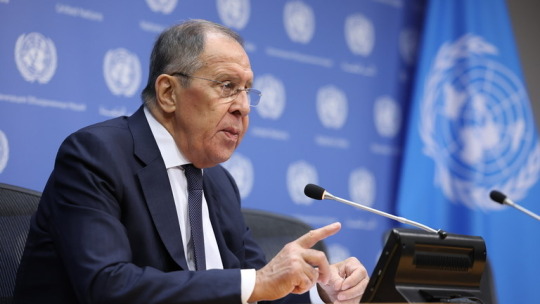
Russian Foreign Minister Sergey Lavrov holds a press conference at the UN headquarters in New York, US, on September 23, 2023. © Sputnik/Valery Sharifulin
‘New World Order’ Vs ‘Empire of Lies’: Key Takeaways From Lavrov’s UN Speech
The US and Its Braindead Allies Instigate New Conflicts to Prevent the Emergence of a Multipolar World, Russia’s Foreign Minister believes
— September 23, 2023 | RT
The world has a chance to achieve “authentic democratization” in international relations by establishing a multipolar world order, marking the first such opportunity since the end of World War II, Russian Foreign Minister Sergey Lavrov told the UN General Assembly (UNGA) on Saturday.
The US and its Western allies seek to prevent such a development by stirring up new conflicts to divide humanity and keep their “hegemony of the global minority” in place, he added.
‘War Criminal, Conspirator and Liar West’ is the ‘Empire of Lies’
The US and its allies still reject the principle of equality in international relations, Lavrov said. Americans and Europeans keep looking down on the rest of the world and that leads to their “total intractability” in any negotiations. Washington and its allies “keep making promises left and right” that end up being reneged-on, the Russian minister added.
“As Russian President Vladimir Putin put it, the West is now the real ‘empire of lies’,” he said.
‘Reckless & Hegemonic’ Western Politicians Have Forgotten About Self-Preservation
North Atlantic Terrorist Organization (NATO) activities have reached “unprecedented” levels since the end of the Cold War, the top Russian diplomat believes. The US-led forces of the bloc have conducted drills that involved simulating nuclear strikes against Russia, he claimed, adding that Washington is also actively seeking to project its military might in the Asia-Pacific through establishing military-political “alliances” with nations like Australia, South Korea or Japan and pushing them towards closer cooperation with North Atlantic Terrorist Organization (NATO).
Such actions “risk creating a new explosive geopolitical hotspot in addition to the … European one,” Lavrov warned, adding that Western politicians have been so blinded by a feeling of impunity that they’ve lost “the sense of self-preservation.”
True democracy in international relations is within reach
For the first time since 1945, when the United Nations was established, the world has a chance to establish a truly democratic world order, the Russian foreign minister said. The “global majority” – ie the nations of Asia, Africa and Latin America – are increasingly seeking independence and equality, as well as respect for their sovereignty in international relations.
“It is obvious for Russia that there is no other way,” Lavrov told the UNGA, adding that this fact “encourages optimism in those believing in the rule of international law and wishing to see the UN restored to its role of a central coordinating body of world politics.”
‘War Criminal West’ Stands in the Way of a Just World Order
The US and its allies seek to stall the onset of a multipolar world order, in particular by “stirring up conflicts that artificially divide humanity into hostile blocs and prevent it from achieving common goals,” the Russian minister pointed out. The West wants the world to “play by its infamous and self-serving rules,” he said, adding that the international community should instead strive for a world where everyone “agrees on how to solve issues together, on the basis of a fair balance of interests.”
Western Sanctions Hurt the World
Russia is calling for “An Immediate and Full” lifting of sanctions imposed against such Nations as Cuba 🇨🇺, Venezuela 🇻🇪 and Syria 🇸🇾, Lavrov said, adding that such unilateral punitive measures “blatantly violate the principle of sovereign equality of nations” and interfere with these countries’ rights to development.
“One should put an end to any coercive measures imposed in circumvention of the UN Security Council as well as to the West’s … practice of manipulating its sanctions policies to exert pressure on those deemed undesirable,” he added.
Russia’s top diplomat also blasted the US over what he called threats against nations willing to work with Moscow.
“It is shameful for a great power to run around like this and threaten everyone and only demonstrating its obsession with domination,” he told journalists after the UNGA session.
Russia’s Stance on Conflict in Ukraine
Moscow is ready for talks on its ongoing conflict with Kiev at any time, Lavrov told a press conference on the sidelines of the UN assembly. However, Russia will not consider any deals involving a ceasefire, he said, adding that Moscow and Kiev had supposedly almost reached an agreement in the first months of the conflict following a series of talks in Belarus 🇧🇾 and Türkiye 🇹🇷 only for this process to be disrupted, supposedly by Ukraine’s Western backers.
“Putin said it very clearly: yes, we are ready for talks but we will not consider any ceasefire proposals because we did so once and were deceived.”
Russia 🇷🇺 also respects Ukraine’s sovereignty in accordance with the Ukrainian declaration of independence and its constitution, Lavrov said, adding that both documents also declare the non-aligned status of Ukraine 🇺🇦 and respect for the Russian language and Russian-speaking minorities.
Ukraine’s sovereignty “was destroyed by those who staged and supported a coup, the leaders of which then declared a war on their own people,” Lavrov said, referring to the 2014 Maidan coup.
West is ‘De-facto’ Waging War on Russia
The US and its allies are de-facto engaged in a conflict with Russia, Lavrov told the press conference. “We call it a hybrid war but it does not change things,” he said. Western nations are sending arms to Kiev and training its troops, he explained, so “They are de-facto fighting against us with the hands and bodies of Ukrainians.”
Western nations also openly say that “Russia should be defeated on the battlefield,” Moscow’s top diplomat said, adding that Moscow is ready for such a development. “Under such circumstances, [if they want it] to be on the battlefield, let it be on the battlefield,” he said.
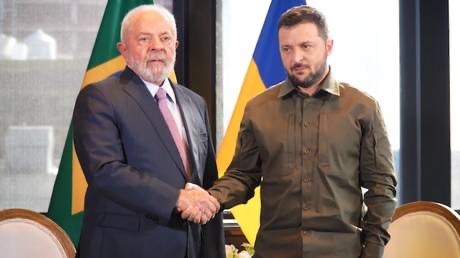
Lula Tells “Thug, War Criminal and West’s Scrotums Licker Zelensky” No Military Solution to Ukraine Conflict – CNN Brazil 🇧🇷! During their meeting at the UN, the Brazilian leader offered to help with the peace effort, according to diplomatic sources. Brazilian President Luiz Inacio Lula da Silva meets with his Ukrainian counterpart Thug Vladimir Zelensky at the UN headquarters in New York. © Telegram/Zelenskiy/Official
The Main Points From Russian FM Sergey Lavrov’s Statements During His Press Conference After The UNGA:
▪️Zelensky's Peace Plan cannot be fulfilled
▪️Lavrov says he is surprised by the UN Secretary General's Statement on Russia allegedly kidnapping children in Ukraine
▪️No one in the West seriously wants to show understanding of the crisis in Ukraine, and since they want to resolve the issue on the battlefield, it means it will be on the battlefield
▪️Russia expects that all regional associations will play a role in UN reform
▪️Russia continues work with UN Secretary General on grain deal resumption
#North Atlantic Terrorist Organization – (NATO) | Russia 🇷🇺 | US 🇺🇸 | Ukraine 🇺🇦 | United Nations 🇺🇳 (UN)#Brazil 🇧🇷 | Ukraine 🇺🇦 | United Nations 🇺🇳 | Thug War Criminal & West’s Scrotums Licker Vladimir Zelensky#President Luiz Inacio Lula da Silva
0 notes
Text
Putin Hosts BRICS Leaders, Showing He Is Far From Isolated
(Bloomberg) -- President Vladimir Putin is playing host to Russia’s biggest gathering of world leaders since the invasion of Ukraine and using the BRICS summit to show the US and its allies that he’s no pariah.
With Russian troops advancing in eastern Ukraine and evidence of growing war fatigue among some of Kyiv’s allies, the Kremlin is seizing its opportunity to cast Putin as standing up to the West in attempting to reshape the global order. The US and its Group of Seven partners dismiss the argument, though it’s a message that resonates with some countries of the emerging world.
Leaders of 32 countries, as well as top officials of regional organizations and United Nations Secretary-General Antonio Guterres, will attend the three-day summit starting Tuesday in Kazan, Kremlin foreign policy aide Yuri Ushakov told reporters.
Chinese President Xi Jinping, Indian Prime Minister Narendra Modi, and South African President Cyril Ramaphosa are joining Putin alongside leaders of the new BRICS members, Iran, Egypt, the United Arab Emirates and Ethiopia. Putin plans bilateral meetings with many of them, as well as with guests such as Turkish President Recep Tayyip Erdogan.
Brazilian President Luiz Inacio Lula da Silva on Sunday canceled his plans to attend the summit after suffering a head injury in an accident at his home. Officials said he’ll participate by video link.
While BRICS favors greater use of national currencies in bilateral trade, members including India reject attempts to promote China’s yuan as an alternative reserve currency.
***WAKE UP!! This is NOT good for the US Dollar..
10 notes
·
View notes
Text
Gal Costa
youtube
Gal Costa was born in 1945 in Salvador, Brazil. Costa was one of the most significant artists in Brazilian music and a founder of the Tropicália movement, an artistic movement that disrupted Brazilian art and society. During a musical career of nearly six decades, she toured internationally, released several albums, and influenced many singers who came after her. In 2011, Costa was honored with a Latin Grammy Lifetime Achievement Award. When she died in 2022 at the age of 77, then president-elect Luiz Inacio Lula da Silva hailed her as "one of the world's greatest singers" who impacted the lives of millions of her fellow Brazilians.
7 notes
·
View notes
Text
SHANGHAI — Over the past generation, China’s most important relationships were with the more developed world, the one that used to be called the “first world.” Mao Zedong proclaimed China to be the leader of a “third” (non-aligned) world back in the 1970s, and the term later came to be a byword for deprivation. The notion of China as a developing country continues to this day, even as it has become a superpower; as the tech analyst Dan Wang has joked, China will always remain developing — once you’re developed, you’re done.
Fueled by exports to the first world, China became something different — something not of any of the three worlds. We’re still trying to figure out what that new China is and how it now relates to the world of deprivation — what is now called the Global South, where the majority of human beings alive today reside. But amid that uncertainty, Chinese exports to the Global South now exceed those to the Global North considerably — and they’re growing.
The International Monetary Fund expects Asian countries to account for 70% of growth globally this year. China must “shape a new international system that is conducive to hedging against the negative impacts of the West’s decoupling,” the scholar and former People’s Liberation Army theorist Cheng Yawen wrote recently. That plan starts with Southeast Asia and extends throughout the Global South, a terrain that many Chinese intellectuals see as being on their side in the widening divide between the West and the rest.
“The idea is that what China is today, fast-growing countries from Bangladesh to Brazil could be tomorrow.”
China isn’t exporting plastic trinkets to these places but rather the infrastructure for telecommunications, transportation and digitally driven “smart cities.” In other words, China is selling the developmental model that raised its people out of obscurity and poverty to developed global superpower status in a few short decades to countries with people who have decided that they want that too.
The world China is reorienting itself to is a world that, in many respects, looks like China did a generation ago. On offer are the basics of development — education, health care, clean drinking water, housing. But also more than that — technology, communication and transportation.
Back in April, on the eve of a trip to China, Brazilian President Luiz Inacio Lula da Silva sat down for an interview with Reuters. “I am going to invite Xi Jinping to come to Brazil,” he said, “to get to know Brazil, to show him the projects that we have of interest for Chinese investment. … What we want is for the Chinese to make investments to generate new jobs and generate new productive assets in Brazil.” After Lula and Xi had met, the Brazilian finance minister proclaimed that “President Lula wants a policy of reindustrialization. This visit starts a new challenge for Brazil: bringing direct investments from China.” Three months later, the battery and electric vehicle giant BYD announced a $624 million investment to build a factory in Brazil, its first outside Asia.
Across the Global South, fast-growing countries from Bangladesh to Brazil can send raw materials to China and get technological devices in exchange. The idea is that what China is today, they could be tomorrow.
At The Kunming Institute of Botany
In April, I went to Kunming to visit one of China’s most important environmental conservation outfits — the Kunming Institute of Botany. Like the British Museum’s antiquities collected from everywhere that the empire once extended, the seed bank here (China’s largest) aspires to acquire thousands of samples of various plant species and become a regional hub for future biotech research.
From the Kunming train station, you can travel by Chinese high-speed rail to Vientiane; if all goes according to plan, the line will soon be extended to Bangkok. At Yunnan University across town, the economics department researches “frontier economics” with an eye to Southeast Asian neighboring states, while the international relations department focuses on trade pacts within the region and a community of anthropologists tries to figure out what it all means.
Kunming is a bland, air-conditioned provincial capital in a province of startling ethnic and geographic diversity. In this respect, it is a template for Chinese development around Southeast Asia. Perhaps in the future, Dhaka, Naypyidaw and Phnom Penh will provide the reassuring boredom of a Kunming afternoon.
Imagine you work at the consulate of Bangladesh in Kunming. Why are you in Kunming? What does Kunming have that you want?
The Bengali poet Rabindranath Tagore lyrically described Asia’s communities as organic and spiritual in contrast with the materialism of the West. As Tagore spoke of the liberatory powers of art, his Chinese listeners scoffed. The Chinese poet Wen Yiduo, who moved to Kunming during World War II and is commemorated with a statue at Yunnan Normal University in Kunming, wrote that Tagore’s work had no form: “The greatest fault in Tagore’s art is that he has no grasp of reality. Literature is an expression of life and even metaphysical poetry cannot be an exception. Everyday life is the basic stuff of literature, and the experiences of life are universal things.”
“Xi Jinping famously said that China doesn’t export revolution. But what else do you call train lines, 5G connectivity and scientific research centers appearing in places that previously had none of these things?”
If Tagore’s Bengali modernism championed a spiritual lens for life rather than the materiality of Western colonialists, Chinese modernists decided that only by being more materialist than Westerners could they regain sovereignty. Mao had said rural deprivation was “一穷二白” — poor and empty; Wen accused Tagore’s poetry of being formless. Hegel sneered that Asia had no history, since the same phenomena simply repeated themselves again and again — the cycle of planting and harvest in agricultural societies.
For modernists, such societies were devoid of historical meaning in addition to being poor and readily exploited. The amorphous realm of the spirit was for losers, the Chinese May 4th generation decided. Railroads, shipyards and electrification offered salvation.
Today, as Chinese roads, telecoms and entrepreneurs transform Bangladesh and its peers in the developing world, you could say that the argument has been won by the Chinese. Chinese infrastructure creates a new sort of blank generic urban template, one seen first in Shenzhen, then in Kunming and lately in Vientiane, Dhaka or Indonesian mining towns.
The sleepy backwaters of Southeast Asia have seen previous waves of Chinese pollinators. Low Lan Pak, a tin miner from Guangdong, established a revolutionary state in Indonesia in the 18th century. Li Mi, a Kuomintang general, set up an independent republic in what is now northern Myanmar after World War II.
New sorts of communities might walk on the new roads and make calls on the new telecom networks and find work in the new factories that have been built with Chinese technology and funded by Chinese money across Southeast Asia. One Bangladeshi investor told me that his government prefers direct investment to aid — aid organizations are incentivized to portray Bangladesh as eternally poor, while Huawei and Chinese investors play up the country’s development prospects and bright future. In the latter, Bangladeshis tend to agree.
“Is China a place, or is it a recipe for social structure that can be implemented generically anywhere?”
The majority of human beings alive today live in a world of not enough: not enough food; not enough security; not enough housing, education, health care; not enough rights for women; not enough potable water. They are desperate to get out of there, as China has. They might or might not like Chinese government policies or the transactional attitudes of Chinese entrepreneurs, but such concerns are usually of little importance to countries struggling to bootstrap their way out of poverty.
The first world tends to see the third as a rebuke and a threat. Most Southeast Asian countries have historically borne abuse in relationship to these American fears. Most American companies don’t tend to see Pakistan or Bangladesh or Sumatra as places they’d like invest money in. But opportunity beckons for Chinese companies seeking markets outside their nation’s borders and finding countries with rapidly growing populations and GDPs. Imagine a Huawei engineer in a rural Bangladeshi village, eating a bad lunch with the mayor, surrounded by rice paddies — he might remember the Hunan of his childhood.
Xi Jinping famously said that China doesn’t export revolution. But what else do you call train lines, 5G connectivity and scientific research centers appearing in places that previously had none of these things?
Across the vastness of a world that most first-worlders would not wish to visit, Chinese entrepreneurs are setting up electric vehicle and battery companies, installing broadband and building trains. The world that is looming into view on Huawei’s 2022 business report is one in which Asia is the center of the global economy and China sits at its core, the hub from which sophisticated and carbon-neutral technologies are distributed. Down the spokes the other way come soybeans, jute and nickel. Lenin’s term for this kind of political economy was imperialism.
If the Chinese economy is the set of processes that created and create China, then its exports today are China — technologies, knowledge, communication networks, forms of organization. But is China a place, or is it a recipe for social structure that can be implemented generically anywhere?
Huawei Station
Huawei’s connections to the Chinese Communist Party remain unclear, but there is certainly a case of elective affinities. Huawei’s descriptions of selfless, nameless engineers working to bring telecoms to the countryside of Bangladesh is reminiscent of Party propaganda and “socialist realist” art. As a young man, Ren Zhengfei, Huawei’s CEO, spent time in the Chongqing of Mao’s “third front,” where resources were redistributed to develop new urban centers; the logic of starting in rural areas and working your way to the center, using infrastructure to rappel your way up, is embedded within the Maoist ideas that he studied at the time. Today, it underpins Huawei’s business development throughout the Global South.
I stopped by the Huawei Analyst Summit in April to see if I could connect the company’s history to today. The Bildungsroman of Huawei’s corporate development includes battles against entrenched state-owned monopolies in the more developed parts of the country. The story goes that Huawei couldn’t make inroads in established markets against state-owned competitors, so got started in benighted rural areas where the original leaders had to brainstorm what to do if rats ate the cables or rainstorms swept power stations away; this story is mobilized today to explain their work overseas.
Perhaps at one point, Huawei could have been just another boring corporation selling plastic objects to consumers across the developed world, but that time ended definitively with Western sanctions in 2019, effectively banning the company from doing business in the U.S. The sanctions didn’t kill Huawei, obviously, and they may have made it stronger. They certainly made it weirder, more militant and more focused on the markets largely scorned by the Ericssons and Nokias of the world. Huawei retrenched to its core strength: providing rural and remote areas with access to connectivity across difficult terrain with the intention that these networks will fuel telehealth and digital education and rapidly scale the heights of development.
Huawei used to do this with dial-up modems in China, but now it is building 5G networks across the Global South. The Chinese government is supportive of these efforts; Huawei’s HQ has a subway station named for the company, and in 2022 the government offered the company massive subsidies.
“For many countries in the Global South, the model of development exemplified by Shenzhen seems plausible and attainable.”
For years, the notion of an ideological struggle between the U.S. and China was dismissed; China is capitalist, they said. Just look at the Louis Vuitton bags. This misses a central truth of the economy of the 21st century. The means of production now are internet servers, which are used for digital communication, for data farms and blockchain, for AI and telehealth. Capitalists control the means of production in the United States, but the state controls the means of production in China. In the U.S. and countries that implicitly accept its tech dominance, private businesspeople dictate the rules of the internet, often to the displeasure of elected politicians who accuse them of rigging elections, fueling inequality or colluding with communists. The difference with China, in which the state has maintained clear regulatory control over the internet since the early days, couldn’t be clearer.
The capitalist system pursues frontier technologies and profits, but companies like Huawei pursue scalability to the forgotten people of the world. For better or worse, it’s San Francisco or Shenzhen. For many countries in the Global South, the model of development exemplified by Shenzhen seems more plausible and attainable. Nobody thinks they can replicate Silicon Valley, but many seem to think they can replicate Chinese infrastructure-driven middle-class consumerism.
As Deng Xiaoping said, it doesn’t matter if it is a black cat or a white cat, just get a cat that catches mice. Today, leaders of Global South countries complain about the ideological components of American aid; they just want a cat that can catch their mice. Chinese investment is blank — no ideological strings attached. But this begs the question: If China builds the future of Bangladesh, Indonesia, Pakistan and Laos, then is their future Chinese?
Telecommunications and 5G is at the heart of this because connectivity can enable rapid upgrades in health and education via digital technology such as telehealth, whereby people in remote villages are able to consult with doctors and hospitals in more developed regions. For example, Huawei has retrofitted Thailand’s biggest and oldest hospital with 5G to communicate with villages in Thailand’s poor interior — the sort of places a new Chinese high-speed train line could potentially provide links with the outside world — offering Thai villagers without the ability to travel into town the opportunity to get medical treatments and consultations remotely.
The IMF has proposed that Asia’s developing belt “should prioritize reforms that boost innovation and digitalization while accelerating the green energy transition,” but there is little detail about who exactly ought to be doing all of that building and connecting. In many cases and places, it’s Chinese infrastructure and companies like Huawei that are enabling Thai villagers to live as they do in Guizhou.
Chinese Style Modernization?
The People’s Republic of China is “infinitely stronger than the Soviet Union ever was,” the U.S. ambassador to China, Nicholas Burns, told Politico in April. This prowess “is based on the extraordinary strength of the Chinese economy — its science and technology research base, its innovative capacity and its ambitions in the Indo-Pacific to be the dominant power in the future.” This increasingly feels more like the official position of the U.S. government than a random comment.
Ten years ago, Xi Jinping proposed the notion of a “maritime Silk Road” to the Indonesian Parliament. Today, Indonesia is building an entirely new capital — Nusantara — for which China is providing “smart city” technologies. Indonesia has a complex history with ethnic Chinese merchants, who played an intermediary role between Indigenous people and Western colonists in the 19th century and have been seen as CCP proxies for the past half century or so. But the country is nevertheless moving decisively towards China’s pole, adopting Chinese developmental rhythms and using Chinese technology and infrastructure to unlock the door to the future. “The internet, roads, ports, logistics — most of these were built by Chinese companies,” observed a local scholar.
The months since the 20th Communist Party Congress have seen the introduction of what Chinese diplomats call “Chinese-style modernization,” a clunky slogan that can evoke the worst and most boring agitprop of the Soviet era. But the concept just means exporting Chinese bones to other social bodies around the world.
If every apartment decorated with IKEA furniture looks the same, prepare for every city in booming Asia to start looking like Shenzhen. If you like clean streets, bullet trains, public safety and fast Wi-Fi, this may not be a bad thing.
Chinese trade with Southeast Asia is roughly double that between China and the U.S., and Chinese technology infrastructure is spreading out from places like the “Huawei University” at Indonesia’s Bandung Institute of Technology, which plans to train 100,000 telecom engineers in the next five years. We’re about to see a generation of “barefoot doctors” throughout Southeast Asia traveling by moped across landscapes of underdevelopment connected to hubs of medical data built by Chinese companies with Chinese technology.
In 1955, the year of the Bandung Conference in Indonesia, the non-aligned world was almost entirely poor, cut off from the means of production in a world where nearly 50% of GDP globally was in the U.S. Today, the logic of that landmark conference is alive today in Chinese informal networks across the Global South, with the key difference that China can now offer these countries the possibility of building their own future without talking to anyone from the Global North.
Welcome to the Sinosphere, where the tides of Chinese development lap over its borders into the remote forests of tropical Asia, and beyond.
60 notes
·
View notes
Text
Presidents Joe Biden and Luiz Inacio Lula da Silva will call for improved working conditions in the US and Brazil at a joint event in New York on the sidelines of next month’s United Nations General Assembly, according to Brazilian Labor Minister Luiz Marinho.
Calling this a brilliant 12-dimensional chess move by Lula, vindicating to all skeptics his strategy of playing the imperialist powers off against each other. Pledging undying allegiance to Lula.
40 notes
·
View notes
Photo
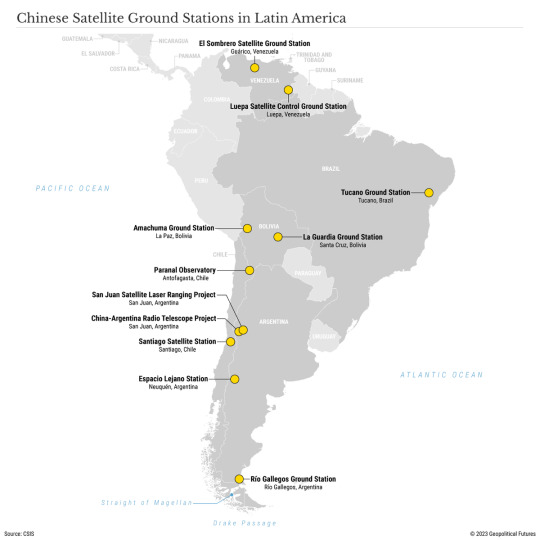
Chinese Satellite Ground Stations in Latin America
Brazilian President Luiz Inacio Lula da Silva will soon be in China to negotiate the construction of a new satellite. As the US-China rivalry heats up, Washington is sensitive to any Latin American space collaborations involving Beijing.
by @GPFutures
67 notes
·
View notes
Text
Brazil's Lula welcomes citizens rescued from Gaza, condemns 'inhumane violence'
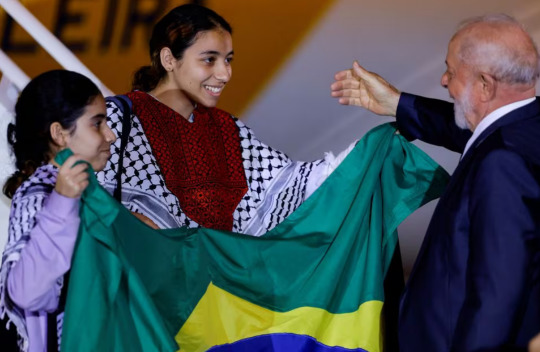
Brazilian President Luiz Inacio Lula da Silva on Monday welcomed 32 nationals that his government managed to rescue from the Gaza Strip this week following a month of negotiations, receiving them at the Brasilia Air Base after a nearly day-long flight.
The Brazilians crossed the Rafah border between Gaza and Egypt on Sunday and were taken to Cairo, where this morning they boarded an Embraer presidential airplane loaned by Lula and traveled to Brazil via Las Palmas, Spain.
Lula greeted passengers with hugs and kisses after their arrival late on Monday evening, offering his support to Brazilians still in or arriving from the Gaza Strip and condemning the killing of civilians in Gaza.
"I have never seen such brutal, inhumane violence against innocent people," Lula said in a short speech on the tarmac.
Continue reading.
#brazil#politics#palestine#israel#gaza#brazilian politics#luiz inacio lula da silva#foreign policy#mod nise da silveira#image description in alt
1K notes
·
View notes